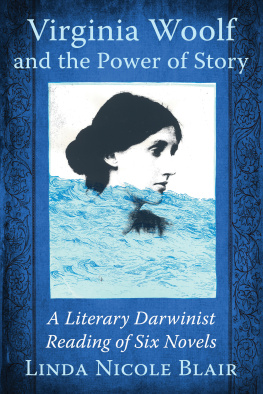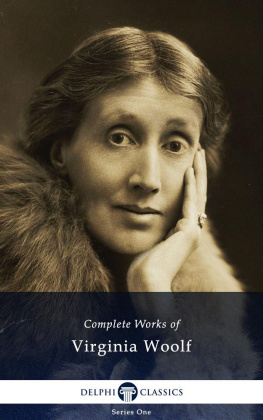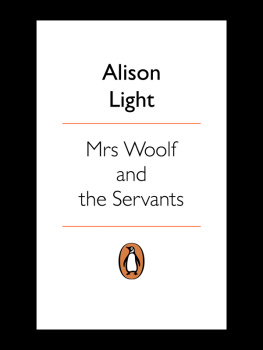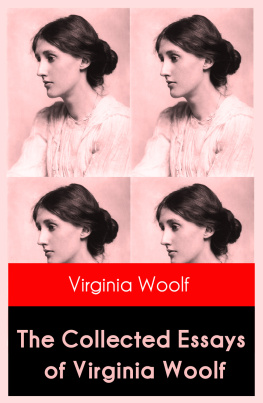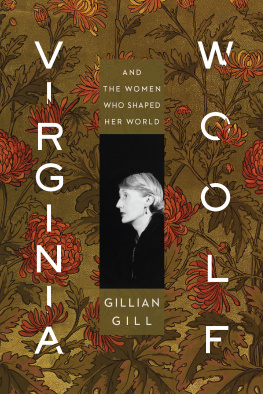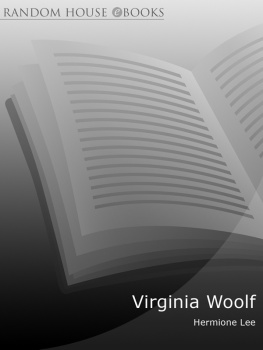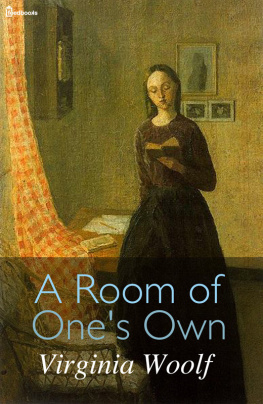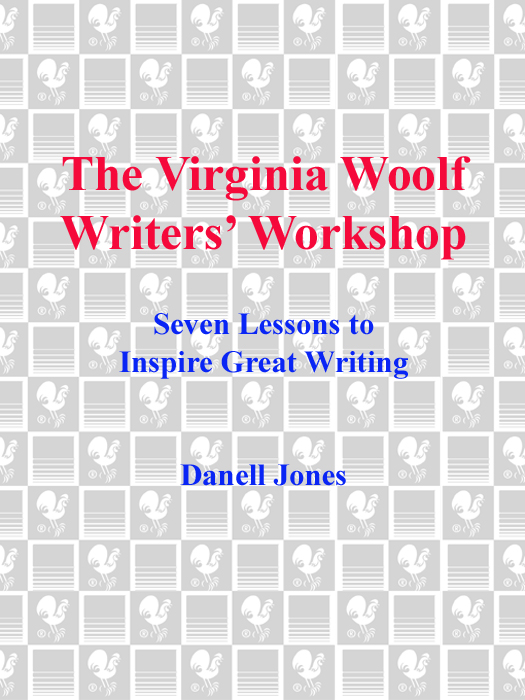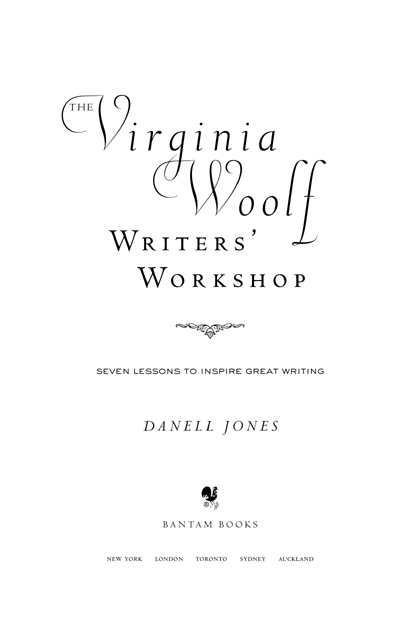THE VIRGINIA WOOLF WRITERS WORKSHOP
A Bantam Book / October 2007
Published by
Bantam Dell
A Division of Random House, Inc.
New York, New York
All rights reserved.
Copyright 2007 by Danell Jones
See for permissions and credits.
Bantam Books is a registered trademark of Random House, Inc., and the colophon is a trademark of Random House, Inc.
Library of Congress Cataloging-in-Publication Data
Jones, Danell.
Virginia Woolf writers workshop : seven lessons to inspire great writing / Danell Jones.
p. cm.
eISBN: 978-0-307-49291-3
1. English languageRhetoric. 2. Creative writing.
3. Woolf, Virginia, 18821941. I. Title.
PE1408.J767 2007
808.042dc22 2007021630
www.bantamdell.com
v3.1
CONTENTS
PREFACE
How many of us have imagined what it would be like to sit down with a great writer to talk shop? If only we could share a pint or two with Shakespeare, spend an afternoon rambling the moors with the Bronts, or join Jane Austen in her sitting room for tea, perhaps we could find out how they wrote those plays, poems, and novels that have enraptured us all these years. And perhaps we could return home with a nugget of wisdom that would be exactly what we needed to help us write our own books.
It is our good fortune that Virginia Woolfs abundant body of work makes just such an imagined conversation possible. In addition to her many novels and stories, she left an extensive diary, thousands of letters, numerous notebooks, and dozens of brilliant essays. We are doubly lucky that in these works she often meditated on the art of writing, pondering what makes a good novel or poem, questioning what living conditions make it possible to create a work of art, and identifying the qualities that writers need to succeed at their craft. Many of the things Woolf might say if we had the chance to meet her are scattered throughout her works.
The idea for this book came in one of those flashes of inspiration that grace writers from time to time. I was rummaging through Woolfs books, collecting the ideas I thought would be of interest to my creative writing students, when suddenly I had a vision of Virginia Woolf swanning into a lecture hall. She was wearing a slightly shabby lilac dress; her fingers were stained with purple ink. She leaned over the podium and in that famously deep, musical, almost electrifying voice said to the class, So you want to write. Woolf teaching a writing workshop, I thought. What a playful way to present some of her ideas about writing, and at the same time, convey something of her life and her personality.
The classroom scenes in this book are purely works of imagination, but they have been inspired by many years of reading and studying Woolfs works. While none of us can know what is in anothers mind, I hope my imagined version of Woolfs thoughts pays homage to the wit and wisdom that infuse her books. In order to reach a little closer to the real person, I have tried, as much as possible, to use her own words. As you read, youll notice that I have put all of her original phrasing in quotation marks. These quotes come directly from her letters, essays, diaries, and novels. However, because I have selected passages from many books and woven them together in this fictional context, Ive had to add transitions here and there in order to keep the conversation fluent. To see how Woolf used these quotations in their original context, simply turn to the back of the book. There each quotation is reprinted along with its source, making it easy for you to find the original essay or letter or diary entry from which it derives. I hope this leads you back to Woolfs works, because there you will get the richness of her ideas, the quickness of her wit, and the sharpness of her intelligence in their original contexta pleasure well worth pursuing!
The many accounts left by those who knew Woolf personally also make it possible to imagine what it would be like to have her teach a writing workshop. Two volumes of reminiscences recorded by her friends and acquaintances provide wonderful details about her life and her character. Who would not love to learn that Woolf was a talented bread baker; her house was cluttered with books and magazines; she loved lawn bowling, drank good coffee, and ate her meals from purple lusterware dishes? As we read the reminiscences, we realize the portrait taking shape is nothing like the neurotic-genius-teetering-on-the-edge-of-madness that seems to dominate so much of the popular imagination. The Virginia Woolf her friends remember was funny and kind and had a wild, hooting laugh. She was magical with children; she loved to tell fantastic stories. Aspiring authors remember her as a famous writer who didnt hoard her fame, but reached out to young writers, encouraging their ideas and publishing their books. The Virginia Woolf they remember impressed them with her unpretentiousness, her imagination, and her intellect. Above all, those who knew her best remembered her immense sense of gaiety.
A couple of accounts in particular make it easy to imagine her out of her writing room at Monks House and into a classroom. In one, her niece describes inviting Woolf up to Newnham College, Cambridge, to chat with students about books. Naturally, the young women were thrilled at the chance to meet this famous writer. Despite Woolfs fame, her niece recalls how unassuming she was, how interested in the young womens ideas, how eager to hear what they had to say. Her friendly, inquisitive manner, she recalls, drew them out of their shells and helped their ideas shine through their shyness. As I read this, my vision of Woolf as a teacher seemed justified.
But of course she wasnt a teacher. She had done a little volunteer teaching at a working men and womens college as a young woman, but she was never a member of a faculty, and she certainly never taught a writing workshop. Nevertheless, the several important lectures she gave about the art of writing do convey a clear sense of what she might have been like in front of a classroom. One thing I think we can be sure of: she would have been funny. Her wit dances across the pages of A Room of Ones Own and Professions for Women, two essays based on lectures she had delivered. Theres little question that she would have brought that clever playfulness to the classroom. But she also would have taken the task of teaching people about writing very seriously. Her remarks to the class, despite flashes of whimsy, would leave no doubt that it was a topic she had considered profoundly.
But is it right to place the very British Woolf in that oh-so-American institution of the writers workshop? To deposit her in one of those stuffy seminar rooms where aspiring writers meet with an established author to talk about writing, to try out new ideas, and to share their work? I think so and heres why: I cant help but believe that the best workshops share the spirit of creative companionship that was so important to Woolf and her friends. Like the Thursday evening get-togethers in Bloomsbury, the workshop offers the chance to talk to people who care about words; to push ones thinking a little further through intelligent conversation; to live, if only for a few hours, in a world that honors above all the well-turned phrase, the dazzle of imagination.


